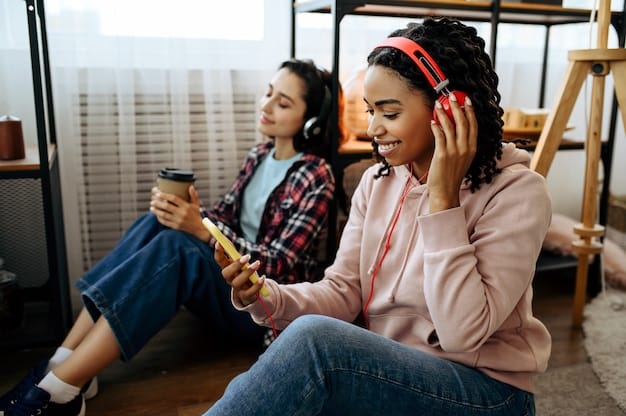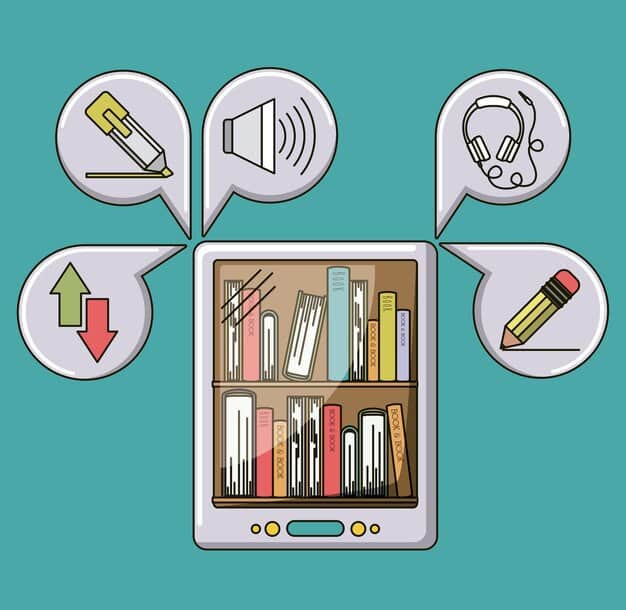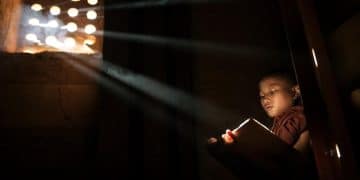How Audiobooks Reshaped Literary Criticism in the US: A New Era

The rise of audiobooks in the US has significantly influenced literary criticism and analysis, shifting focus from textual interpretation to auditory experience and impacting accessibility, scholarly approaches, and the overall understanding of literature.
The landscape of literary criticism in the US has undergone a notable transformation, largely influenced by the increasing popularity of audiobooks. This shift has prompted new perspectives on how literature is consumed, analyzed, and understood. Let’s delve into how has the rise of audiobooks influenced literary criticism and analysis in the US?
The Democratization of Literature Through Audiobooks
Audiobooks have broadened access to literature for various demographics, including those with visual impairments, learning disabilities, or busy lifestyles. This increased accessibility has profound implications for who engages with literary works and, consequently, who participates in literary discussions.
Accessibility and Inclusivity
Traditionally, literary criticism focused on the written text, often requiring close reading and textual analysis. Audiobooks offer an alternative entry point, allowing listeners to engage with literature in a more passive or multi-tasking manner. This democratization challenges traditional notions of literary engagement.
Broader Audience Participation
The ease of listening to audiobooks during commutes, workouts, or household chores has attracted a wider audience to literary works. This expanded readership brings diverse perspectives and experiences to literary discussions, enriching the critical landscape.

The rise of audiobooks isn’t only about accessibility; it’s about reshaping how we perceive intellectual engagement, making literary analysis more inclusive and diverse.
- Increased Reach: Audiobooks transcend geographical barriers and reach underserved populations.
- Multitasking Engagement: Allows literary engagement during activities where reading isn’t possible.
- Diverse Perspectives: Broader audience participation enriches critical discussions.
- Redefining Literacy: Challenges traditional definitions of literacy and textual engagement.
In essence, audiobooks redefine participation in literary discourse, making it accessible to a more diverse audience and challenging traditional notions of literary consumption.
Shifting Focus in Literary Analysis: From Text to Performance
Audiobooks introduce a performative element to literary analysis, shifting the focus from the written text to the narrator’s interpretation and vocal delivery. This performative aspect adds a new layer of complexity to literary criticism.
The Role of the Narrator
The narrator’s voice, intonation, and pacing influence the listener’s understanding and emotional response to the text. Literary critics now consider the narrator’s performance as an integral part of the literary experience.
Aural Interpretation
Analyzing the narrator’s choices, such as character accents or emotional emphasis, becomes a crucial aspect of literary criticism. The audiobook’s interpretation can either enhance or detract from the author’s original intent.
The narrator’s reading isn’t just a retelling of words, but constitutes another interpretation layer. This shift impacts literary analysis profoundly.
- Narrator’s Influence: Voice, intonation, and pacing shape listener interpretation.
- Performance Analysis: Narrator choices dissected for their impact on the text.
- Enhancement or Detraction: Aural interpretation can either improve or diminish the original work.
- New Critical Lens: Literary criticism expands to include performative aspects.
The rise of audiobooks has necessitated a re-evaluation of literary criticism, integrating the performative elements of narration into the analysis.
Impact on Traditional Literary Criticism Methods
The rise of audiobooks challenges traditional literary criticism methods that prioritize close reading and textual analysis. Critics are now grappling with how to adapt their approaches to accommodate the auditory experience.
The Challenge to Close Reading
Traditional literary criticism relies heavily on close reading, involving meticulous examination of textual details, linguistic patterns, and literary devices. Audiobooks, however, encourage a more passive mode of engagement, which can make close reading more difficult.
New Methodologies
Scholars are developing new methodologies that incorporate both textual analysis and auditory analysis. This involves considering the relationship between the written word and the spoken word, as well as the impact of sound effects and music on the listening experience.
The shift from text to sound requires a rethinking of core analytical tenets used for decades. Traditional literary criticism is continuously evolving.
- Limitations of Traditional Methods: Close reading becomes challenging with passive audiobook consumption.
- Hybrid Analysis: Integration of textual and auditory methodologies.
- Sound and Music: Consideration of audio elements’ impact on listener experience.
- Evolving Scholarly Approaches: Literary criticism adapts to incorporate auditory dimensions.
Integrating auditory analysis with traditional textual criticism enables a more thorough understanding of literature’s impact, addressing both the written and spoken elements.

Effects on Scholarly Debate and Interpretation
Audiobooks have fueled scholarly debates regarding the authenticity and validity of auditory interpretations of literary works. The question of how much the narrator’s interpretation should influence critical analysis remains a contentious issue.
Authenticity and Interpretation
Some critics argue that audiobooks offer an authentic representation of the author’s intent, while others contend that the narrator’s interpretation inevitably alters the original work. These debates challenge the notion of a single, definitive interpretation of a literary text.
Multiple Perspectives
The accessibility of audiobooks has led to a proliferation of literary discussions and online communities, where listeners share their interpretations and engage in critical analysis. This decentralization of literary criticism empowers readers to challenge established scholarly perspectives.
Diverse interpretations foster a more dynamic and democratic critical literary analysis, allowing scholars to challenge established thoughts and opinions.
- Interpretation Validity: Different views on how narration affects the original work’s authenticity.
- Scholarly Disagreements: Ongoing debates about narrator influence over critical assessments.
- Decentralized Criticism: Accessible platforms for audiobook listeners to give opinions.
- Challenging Perspectives: Reader empowerment to question and redefine traditional scholarly views.
By enabling a plethora of interpretations, audiobooks democratize analysis and scholarly debate about literature.
The Audiobook as a Medium for Literary Adaptation
Audiobooks are increasingly recognized as a distinct medium for literary adaptation, offering unique opportunities for creative interpretation and experimentation. This recognition has implications for how literary works are adapted and consumed.
Creative Interpretation
Audiobook adaptations often incorporate sound effects, music, and multiple voice actors to enhance the listening experience. These creative elements can transform the original text into a fully immersive auditory world.
Experimentation with Form
Audiobooks allow for experimentation with narrative structure and storytelling techniques. Some adaptations use unconventional sound design or interactive elements to engage listeners in new and innovative ways.
Audiobooks are not just conversions, but reinterpretations. These adaptations contribute new meanings into popular literary texts.
- Unique Opportunities: Audiobooks provide a medium for literary reinvention.
- Enhanced Listening: The addition of voice actors, music and sound elevates the listening experience.
- Innovative Storytelling: New narrative structures engage listeners inventively.
- Auditory World: Adaptions transform the original text into an immersive environment.
Audiobooks transform our literary texts through auditory means, enhancing our engagement by expanding their creative storytelling possibilities.
The Future of Literary Criticism in the Age of Audiobooks
The future of literary criticism in the US will continue to be shaped by the rise of audiobooks and other digital media. As technology evolves, new forms of literary engagement and analysis are likely to emerge, challenging traditional notions of what it means to read and interpret literature.
Technological Advances
Artificial intelligence and machine learning could play a significant role in analyzing audiobooks, automatically identifying patterns, themes, and stylistic devices. This could lead to new insights into literary works and their reception by listeners.
Interdisciplinary Approaches
Literary criticism may become more interdisciplinary, drawing on insights from fields such as cognitive science, sound studies, and digital humanities. This would enable critics to develop a more holistic understanding of the literary experience.
New technologies alongside interdisciplinary thinking will open new doors within how we approach literary criticism in the future.
- Emerging Technologies: Potential use of AI to analyze text, styles and themes.
- Evolving Literary Engagement: Changes in interpretation as technology advances.
- Holistic Understanding: Merging of humanities, science, and digital studies.
- Future Transformation: Ongoing change due to new forms of engagement.
The rise of audiobooks continues to revolutionize literary criticism, combining technological and interdisciplinary advances to gain a more complete understanding of the literary experience.
| Key Element | Brief Description |
|---|---|
| 🎧 Accessibility | Audiobooks democratize literature, reaching broader audiences. |
| 🗣️ Narrator’s Role | Performative impact of narrators shapes interpretation of literature. |
| 📚 Scholarly Adaptation | Literary criticism evolves, integrating auditory with textual analysis. |
| 💡 Future Trends | AI and interdisciplinary methods may further revolutionize literary criticism. |
Frequently Asked Questions
▼
Audiobooks provide access to literature for individuals with visual impairments and literacy challenges, allowing them to engage with texts through audio formats. This broadens access to literary works for diverse populations.
▼
The narrator’s performance interprets the text through voice, intonation, and pacing, influencing the listener’s understanding and emotional response. Literary criticism now analyzes these performative aspects as integral to the audiobook experience.
▼
Traditional literary methods are adapting to incorporate auditory analysis, considering both the textual and auditory elements of a work. This involves new methodologies that analyze the relationship between the written and spoken word.
▼
Accessibility leads to more literary discussions and online communities, empowering readers to share interpretations and challenge traditional perspectives. Increased access leads to more dynamic scholarly discourse.
▼
Audiobooks offer creative freedom in literary interpretation through sound design, voice acting, and music. These elements transform texts into immersive auditory experiences, providing unique artistic avenues.
Conclusion
In conclusion, the rise of audiobooks has profoundly reshaped literary criticism and analysis in the US. By democratizing access to literature, shifting the focus to performance, challenging traditional methods, fueling scholarly debates, and offering new avenues for literary adaptation, audiobooks have ushered in a new era of literary engagement and understanding.





